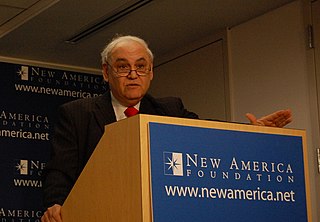A Quote by Richard Perle
In any event, the problem in Iran is much bigger than weapons. The problem is the terrorist regime that seeks the weapons. The regime must go.
Related Quotes
Iran aggressively pursues these weapons and exports terror, while an unelected few repress the Iranian people's hope for freedom. The Iraqi regime has plotted to develop anthrax, and nerve gas, and nuclear weapons for over a decade. This is a regime that has already used poison gas to murder thousands of its own citizens - leaving the bodies of mothers huddled over their dead children.
We do know that the Iraqi regime has chemical and biological weapons. His regime has amassed large, clandestine stockpiles of chemical weapons - including VX, sarin, cyclosarin and mustard gas. His regime has amassed large, clandestine stockpiles of biological weapons—including anthrax and botulism toxin, and possibly smallpox.
In addition to declaring and destroying all of its weapons of mass destruction, Iraq must end its support for terrorism. It must cease the persecution of its civilian population. It must stop all illicit trade outside the oil-for-food program. And it must release or account for all Gulf War personnel, including an American pilot, whose fate is still unknown. By taking these steps, and only by taking these steps, the Iraqi regime has an opportunity to avoid conflict. These steps would also change the nature of the Iraqi regime itself. America hopes the regime will make that choice.
Change of regime with respect to Iraq had nothing to do with this; it had everything to do with the fact that Iraq had weapons of mass destruction. And at the time change in regime as a policy came into effect in 1998, it was seen as the only way to compel Iraq to get rid of its weapons of mass destruction.
Regime change has been an American policy under the Clinton administration, and it is the current policy. I support the policy. But regime change in and of itself is not sufficient justification for going to war--particularly unilaterally--unless regime change is the only way to disarm Iraq of the weapons of mass destruction pursuant to the United Nations resolution.
It remains our policy to change the regime until such time as the regime changes itself. So far, we cannot be sure that he is cooperating or he [Saddam Hussein] is acting in a way that could give us comfort, or should give the international community comfort, that he is giving up his weapons of mass destruction. He continues to give us statements that suggest he is not in possession of weapons of mass destruction when we know he is.
In the area of international security, taking into account that the United States and Russia are the largest nuclear powers: We are ready to jointly work to strengthen the non-proliferation regime for weapons of mass destruction and their means of delivery. We are ready to work together, and much closer than before, on the problem of fighting terrorism, international terrorism, and here we certainly have vast opportunities.






























